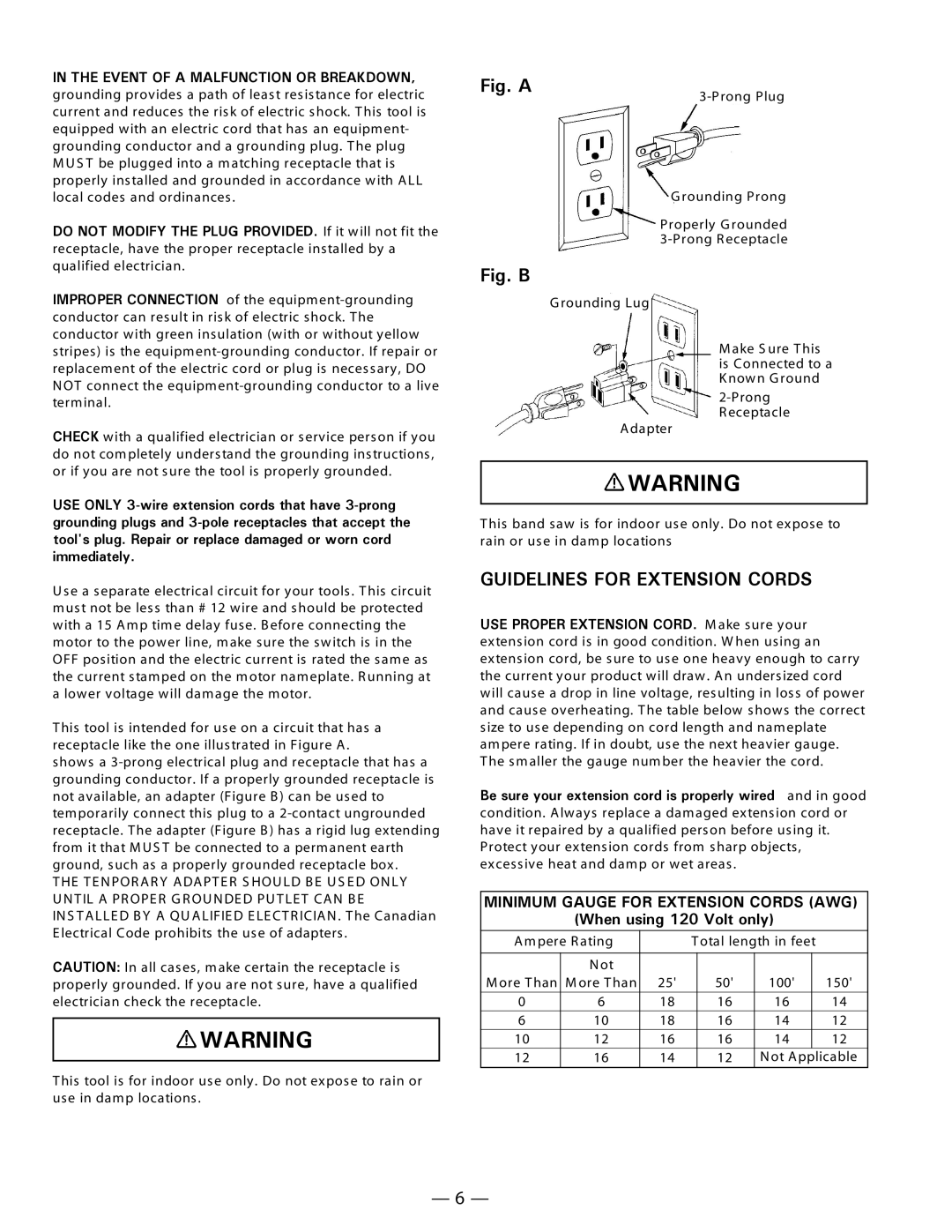
IN THE EVENT OF A MALFUNCTION OR BREAKDOWN, grounding provides a path of least resistance for electric current and reduces the risk of electric shock. T his tool is equipped with an electric cord that has an equipment- grounding conductor and a grounding plug. T he plug M U S T be plugged into a matching receptacle that is properly installed and grounded in accordance with ALL local codes and ordinances .
DO NOT MODIFY THE PLUG PROVIDED. If it will not fit the receptacle, have the proper receptacle installed by a qualified electrician.
IMPROPER CONNECTION of the
CHECK with a qualified electrician or service person if you do not completely understand the grounding instructions, or if you are not sure the tool is properly grounded.
USE ONLY
U se a separate electrical circuit for your tools . T his circuit must not be less than # 12 wire and should be protected with a 15 Amp time delay fuse. B efore connecting the motor to the power line, make sure the switch is in the OFF position and the electric current is rated the same as the current stamped on the motor nameplate. R unning at a lower voltage will damage the motor.
T his tool is intended for use on a circuit that has a receptacle like the one illustrated in Figure A .
shows a
T HE T E N POR AR Y ADAPT E R S HOU LD B E U S E D ON LY U N T IL A PR OPE R G R OU N DE D PU T LE T CAN B E
IN S T ALLE D B Y A QU ALIFIE D E LE CT R ICIAN . T he Canadian E lectrical Code prohibits the use of adapters .
CAUTION: In all cases, make certain the receptacle is properly grounded. If you are not sure, have a qualified electrician check the receptacle.
![]() WARNING
WARNING
T his tool is for indoor use only. Do not expose to rain or use in damp locations .
Fig. A
G rounding Prong
Properly G rounded
Fig. B
G rounding Lug
M ake S ure T his is Connected to a K nown G round
R eceptacle
Adapter
![]() WARNING
WARNING
T his band saw is for indoor use only. Do not expose to rain or use in damp locations
GUIDELINES FOR EXTENSION CORDS
USE PROPER EXTENSION CORD. M ake sure your extension cord is in good condition. W hen using an extension cord, be sure to use one heavy enough to carry the current your product will draw . An undersized cord will cause a drop in line voltage, resulting in loss of power and cause overheating. T he table below shows the correct size to use depending on cord length and nameplate ampere rating. If in doubt, use the next heavier gauge.
T he smaller the gauge number the heavier the cord.
Be sure your extension cord is properly wired and in good condition. Always replace a damaged extension cord or have it repaired by a qualified person before using it. Protect your extension cords from sharp objects, excessive heat and damp or wet areas .
MINIMUM GAUGE FOR EXTENSION CORDS (AWG) (When using 120 Volt only)
Ampere R ating |
| T otal length in feet |
| ||||
|
|
|
|
|
|
|
|
| N ot |
|
|
|
|
|
|
M ore T han | M ore T han | 25' |
| 50' | 100' |
| 150' |
0 | 6 | 18 |
| 16 | 16 |
| 14 |
6 | 10 | 18 |
| 16 | 14 |
| 12 |
10 | 12 | 16 |
| 16 | 14 |
| 12 |
12 | 16 | 14 |
| 12 | N ot Applicable | ||
— 6 —
